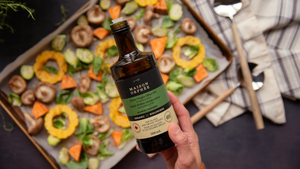By Science + Fourchette
The process of putting the mention “extra virgin” on a bottle of olive oil requires meticulous craftsmanship and technical knowledge, not chance, and these two words hold a ton of meaning.
" Extra" first
Only virgin olive oil that meets very specific industry criteria will be classified “extra”. The main distinction between “extra virgin” and “virgin” olive oil is the quality of the olives. Their quality is heavily influenced by 3 major factors: Climatic conditions, harvesting methods and storage conditions. The fresh nature of olives makes it impossible to have perfect control over them from the field to their transformation.
" Virgin" in second
The olives, once harvested and sorted, undergo a cold extraction. This means that they are mechanically pressed at room temperature without receiving any chemical treatment or refining. The extracted oil is then filtered to obtain a product of impeccable quality, hence a virgin olive oil.
Extra" standards
It is important to note that there is little to no global certification supervision: each company that markets olive oil is responsible for determining whether its product meets the “extra” standards or not.
The first criterion for being classified as “extra” is very objective: it is the oleic acid content. An “extra virgin” olive oil will have a free acidity - measured in oleic acid - that does not exceed 0.8%. The lower this level, the more the organoleptic characteristics of the oil will be preserved.
An extraordinary oil
The other criteria are more subjective, and this is where the olive oil industry sometimes fails consumers.
The product must be free of defects (e.g., rancidity). At Maison Orphée, an expert committee analyzes the organoleptic qualities of its oils, i.e., the characteristic flavors and smell. They must be of superior quality and without defects, but also have positive attributes.
An extra oil must be "PBF":
- P for Peppery
- B for Bitter
- F for Fruity
Choosing an “extra virgin” olive oil is supposed to be a guarantee of high quality. The real challenge lies in identifying companies whose processes allow them to attribute this classification with rigour and honesty.
This usually corresponds to a fair price, because quality does not know shortcuts!

